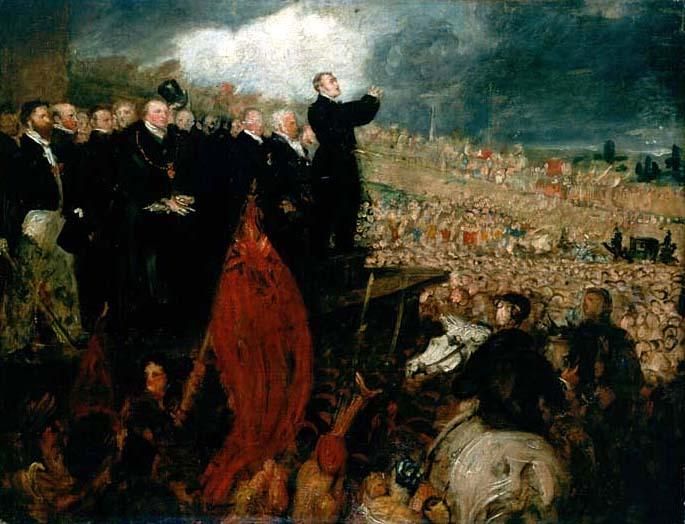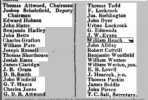… in which the folk of Birmingham play a leading role in reaching a milestone on the path to British democracy.
I’m sure this story is familiar to many here, but I didn’t find it summarized in a recent post, so thought it might be worth recounting my understanding of the events in question. Corrections welcome!
In 1830, the country was in economic turmoil. With the Duke of Wellington's government riven by in-fighting over the recently passed Catholic Emancipation Act, there was an upswell of public opinion that the landed gentry who dominated Parliament were out of touch with the needs of ordinary folk in increasing financial distress.
MPs were elected from the shires, and from boroughs with wildly differing rules on who could vote, some of which enfranchised so few voters that they could easily be bought by wealthy interests as ‘rotten boroughs’. Newer industrial cities like Birmingham did not have their own representatives. By some estimates only 1% of the population had the vote.
It was in this climate that country banker Thomas Attwood assembled a group of leaders from Birmingham’s workshop economy, with whom he founded the Birmingham Political Union "To obtain by every just and legal means such a Reform in the Commons House of Parliament as may ensure a real and effectual Representation of the Lower and Middle Classes of the People in the House."
At its initial meeting, Attwood and his co-founders addressed a gathering of 12,000 to 15,000 at Beardsworth’s horse and carriage repository, reported as “the largest meeting ever assembled in this kingdom within the walls of a building”*, inspiring other cities to form their own unions based on the BPU's tenets of non-violent protest. Wellington's subsequent speech on the matter, explaining why he felt no electoral reform was necessary, so profoundly misjudged the mood of the public that his Government imploded and he was forced to resign by a no confidence motion within the fortnight.
The Reform Act's tumultuous passage through Parliament** feels to me very reminiscent of recent years' parliamentary shenanigans, with parliamentary power initially finely balanced between Earl Grey's pro-reform Whigs and the Duke of Wellington's anti-reform Tories. The years from 1830 to 1832 saw the Prime Ministership change hands between the Earl and the Duke several times through resignations, confidence votes, fragile coalitions and snap elections, with prorogations of Parliament and battles within and between the Commons and the Lords. Obstructions to the bill had seen huge protests and riots in many cities, with Bristol held by rioters for three days, and attempts at forming national pressure groups had been outlawed, but the BPU carefully kept their actions legal and non-violent, giving the Government no legitimate grounds to obstruct their protests.
By May 1832, the bill had been passed by the now overwhelmingly pro-Reform Commons, but was hamstrung by the Tory-dominated House of Lords, Earl Grey had resigned and Wellington was Prime Minister once again. During the ensuing unrest known as the "Days of May" the BPU met at Newhall Hill with 200,000 people calling for the passage of the bill ***, claiming the support of 2 million and supporting other unions' calls for a run on the banks to put further pressure on the House of Lords. With so clear a demonstration of public unrest, and sentiment in support of the bill around the country, and with the French Revolution still a vivid memory, the King intervened, Earl Grey was reinstated**** and Wellington convinced enough Tory Lords to drop their opposition. The Reform Act passed into law on 7th June 1832.
The Reform Act 1832 abolished most of the rotten boroughs, established electoral representation for the industrial cities, and significantly extended voting rights among the middle class. Thomas Attwood and fellow BPU leader Joshua Scholefield were elected Birmingham's first MPs.
The Act had some grounds for criticism both contemporary and modern: Although the pre-reform franchise had nearly always excluded women in practice, the 1832 Act was the first to deny women the vote in law. The working class folk of Birmingham, whose support to the BPU had been so critical in generating public pressure to reform, would be disappointed to find their hopes of gaining the vote themselves dashed. Thomas Attwood went on to influence the beginnings of the Chartist movement, but without nearly the same impact as his earlier achievements, and universal suffrage would take many more generations to achieve.
Nonetheless, the 1832 Reform Act was a major step towards the UK's parliamentary democracy as we know it today, and the people of Birmingham were at the forefront of the campaign that brought it about.
* The Morning Journal (London), 27th January 1830
** For more details, the Wikipedia article on the topic has a good account of the parliamentary proceedings (https://en.wikipedia.org/wiki/Reform_Act_1832)
*** For a depiction of the “Days of May” meeting, see Pedrocut’s post:
https://birminghamhistory.co.uk/for...ffices-great-charles-street.50508/post-760297
**** The Birmingham Political Union celebrates the recall of Earl Grey at a meeting on Newhall hill:

(https://en.wikipedia.org/wiki/Birmingham_Political_Union)
I’m sure this story is familiar to many here, but I didn’t find it summarized in a recent post, so thought it might be worth recounting my understanding of the events in question. Corrections welcome!
In 1830, the country was in economic turmoil. With the Duke of Wellington's government riven by in-fighting over the recently passed Catholic Emancipation Act, there was an upswell of public opinion that the landed gentry who dominated Parliament were out of touch with the needs of ordinary folk in increasing financial distress.
MPs were elected from the shires, and from boroughs with wildly differing rules on who could vote, some of which enfranchised so few voters that they could easily be bought by wealthy interests as ‘rotten boroughs’. Newer industrial cities like Birmingham did not have their own representatives. By some estimates only 1% of the population had the vote.
It was in this climate that country banker Thomas Attwood assembled a group of leaders from Birmingham’s workshop economy, with whom he founded the Birmingham Political Union "To obtain by every just and legal means such a Reform in the Commons House of Parliament as may ensure a real and effectual Representation of the Lower and Middle Classes of the People in the House."
At its initial meeting, Attwood and his co-founders addressed a gathering of 12,000 to 15,000 at Beardsworth’s horse and carriage repository, reported as “the largest meeting ever assembled in this kingdom within the walls of a building”*, inspiring other cities to form their own unions based on the BPU's tenets of non-violent protest. Wellington's subsequent speech on the matter, explaining why he felt no electoral reform was necessary, so profoundly misjudged the mood of the public that his Government imploded and he was forced to resign by a no confidence motion within the fortnight.
The Reform Act's tumultuous passage through Parliament** feels to me very reminiscent of recent years' parliamentary shenanigans, with parliamentary power initially finely balanced between Earl Grey's pro-reform Whigs and the Duke of Wellington's anti-reform Tories. The years from 1830 to 1832 saw the Prime Ministership change hands between the Earl and the Duke several times through resignations, confidence votes, fragile coalitions and snap elections, with prorogations of Parliament and battles within and between the Commons and the Lords. Obstructions to the bill had seen huge protests and riots in many cities, with Bristol held by rioters for three days, and attempts at forming national pressure groups had been outlawed, but the BPU carefully kept their actions legal and non-violent, giving the Government no legitimate grounds to obstruct their protests.
By May 1832, the bill had been passed by the now overwhelmingly pro-Reform Commons, but was hamstrung by the Tory-dominated House of Lords, Earl Grey had resigned and Wellington was Prime Minister once again. During the ensuing unrest known as the "Days of May" the BPU met at Newhall Hill with 200,000 people calling for the passage of the bill ***, claiming the support of 2 million and supporting other unions' calls for a run on the banks to put further pressure on the House of Lords. With so clear a demonstration of public unrest, and sentiment in support of the bill around the country, and with the French Revolution still a vivid memory, the King intervened, Earl Grey was reinstated**** and Wellington convinced enough Tory Lords to drop their opposition. The Reform Act passed into law on 7th June 1832.
The Reform Act 1832 abolished most of the rotten boroughs, established electoral representation for the industrial cities, and significantly extended voting rights among the middle class. Thomas Attwood and fellow BPU leader Joshua Scholefield were elected Birmingham's first MPs.
The Act had some grounds for criticism both contemporary and modern: Although the pre-reform franchise had nearly always excluded women in practice, the 1832 Act was the first to deny women the vote in law. The working class folk of Birmingham, whose support to the BPU had been so critical in generating public pressure to reform, would be disappointed to find their hopes of gaining the vote themselves dashed. Thomas Attwood went on to influence the beginnings of the Chartist movement, but without nearly the same impact as his earlier achievements, and universal suffrage would take many more generations to achieve.
Nonetheless, the 1832 Reform Act was a major step towards the UK's parliamentary democracy as we know it today, and the people of Birmingham were at the forefront of the campaign that brought it about.
* The Morning Journal (London), 27th January 1830
** For more details, the Wikipedia article on the topic has a good account of the parliamentary proceedings (https://en.wikipedia.org/wiki/Reform_Act_1832)
*** For a depiction of the “Days of May” meeting, see Pedrocut’s post:
https://birminghamhistory.co.uk/for...ffices-great-charles-street.50508/post-760297
**** The Birmingham Political Union celebrates the recall of Earl Grey at a meeting on Newhall hill:

(https://en.wikipedia.org/wiki/Birmingham_Political_Union)


